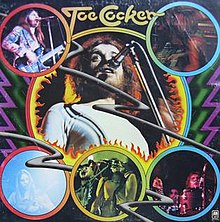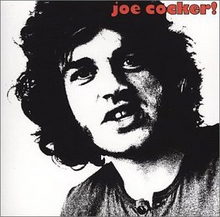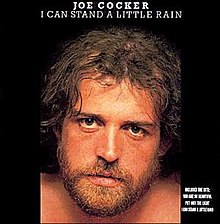Rock and roll music

| This article possibly contains original research. Please improve it by verifying the claims made and adding inline citations. Statements consisting only of original research should be removed. (October 2024) (Learn how and when to remove this message) |
1972 studio album by Joe Cocker
| Review scores | |
|---|---|
| Source | Rating |
| Allmusic | [1] |
| Christgau`s Record Guide | B+[2] |
Álbums chronology
Something To Say (a.k.a. Joe Cocker)
Joe Cocker
Discográfica: A&M SP 4368 · · Productor: Denny Cordell and Nigel Thomas
CHARTS
AUS
CAN
FRA
GER
ITA
US
CERTIFICATIONS
|
1
|
Pardon Me Sir
Joe Cocker •
w: Joe Cocker and Chris Stainton •
1972 /11 Side 1
|
3:17 |
|
|
|
2
|
High Time We Went
Joe Cocker •
w: Joe Cocker and Chris Stainton •
1972 /11 Side 1
|
4:25 |
|
|
|
3
|
She Don`t Mind
Joe Cocker •
w: Joe Cocker and Chris Stainton •
1972 /11 Side 1
|
3:13 |
|
|
|
4
|
Bl
Joe Cocker •
w: Joe Cocker and Chris Stainton •
1972 /11 Side 1
|
4:37 |
|
|
|
5
|
Something to Say
Joe Cocker •
w: Joe Cocker, Peter Nicholls •
1972 /11 Side 1
|
5:00 |
|
|
|
6
|
Midnight Rider
Joe Cocker •
w: Gregg Allman, Robert Payne •
1972 /11 Side 1
|
4:00 |
|
|
|
7
|
Do Right Woman
Joe Cocker •
w: live •
1972 /11 Side 1
|
7:00 |
|
|
|
8
|
Woman to Woman
Joe Cocker •
w: Joe Cocker and Chris Stainton •
1972 /11 Side 1
|
4:26 |
|
|
|
9
|
St. James Infirmary
Joe Cocker •
w: live •
1972 /11 Side 1
|
6:10 |
|
Singles
No se encontraron resultados
Singles
| Joe Cocker | ||||
|---|---|---|---|---|
 | ||||
| Studio album by | ||||
| Released | November 1972 | |||
| Recorded | 1971–1972 | |||
| Genre | Blues rock, Southern rock | |||
| Length | 42:28 | |||
| Label | A&M SP 4368 | |||
| Producer | Denny Cordell and Nigel Thomas | |||
| Joe Cocker chronology | ||||
| ||||
| Singles from Joe Cocker | ||||
| ||||
Review
| This article possibly contains original research. Please improve it by verifying the claims made and adding inline citations. Statements consisting only of original research should be removed. (October 2024) (Learn how and when to remove this message) |
1972 studio album by Joe Cocker
| Review scores | |
|---|---|
| Source | Rating |
| Allmusic | [1] |
| Christgau`s Record Guide | B+[2] |
Joe Cocker is the third studio album by Joe Cocker, released in 1972 in Europe as Something to Say on Cube Records, and in the USA as Joe Cocker on A&M Records. It contains the hit single "High Time We Went", that was released in the summer of 1971. Joe Cocker signalled Cocker`s change of direction into a more jazzy, blues style. The album reached no. 30 in the US album charts. However, although it received a positive response from the press, it made no impression on the British and European charts.
It is an unusual LP among Joe Cocker albums, in that he wrote the lyrics to six songs. Five of them were co-written with Chris Stainton between 1969 and 1972. "Something To Say" was written with Nichols. However, the album`s main claim to fame is that one of its tracks, "Woman to Woman", was the basis for Tupac Shakur`s successful hit single "California Love".
The album, re-titled as Something to Say, was originally released on CD in 1990 by Castle Communications and in 1998 a remastered edition of the album was released worldwide on A&M Records. Alan White, soon to be Yes` drummer, played on this album alongside Jim Keltner, after he was featured on George Harrison`s All Things Must Pass and John Lennon`s Live Peace in Toronto, Imagine and Sometime in New-York City albums. Conrad Isidore played with Steve Stills and Hummingbird, among others. Percussionist Rebop Kwaku Baah was known for his work with Traffic and the German band Can.
Track listing
All tracks composed by Joe Cocker and Chris Stainton, except where indicated.
Side One
- "Pardon Me Sir" – 3:17
- "High Time We Went" – 4:25
- "She Don`t Mind" – 3:13
- "Black-Eyed Blues" – 4:37
- "Something to Say" (Joe Cocker, Peter Nicholls) – 5:00
Side Two
- "Midnight Rider" (Gregg Allman, Robert Payne) – 4:00
- "Do Right Woman" (live) (Dan Penn, Chips Moman) – 7:00
- "Woman to Woman" – 4:26
- "St. James Infirmary" (live) (Traditional, Frank Assunto; arranged by Chris Stainton and Joe Cocker) – 6:10
On the album`s release, the tracks that received the most attention on radio were "Black-Eyed Blues", "Woman to Woman", and the cover version of Gregg Allman`s "Midnight Rider", which charted on the Billboard Hot 100, peaking at number 27.
In 1996, the horn-and-piano riff from "Woman to Woman" was sampled by Tupac Shakur in his song "California Love"; it was a smash hit for Tupac, reaching No. 1 on the Billboard Hot 100. "Woman to Woman" was also featured in the soundtrack for the 2004 video game Grand Theft Auto: San Andreas, on the fictional classic rock radio station K-DST.
Personnel
- Joe Cocker – lead vocals, arrangements (9)
- Chris Stainton – acoustic piano, Hammond organ, arrangements (9)
- Neil Hubbard – guitars
- Alan Spenner – bass
- Jim Keltner – drums
- Alan White – drums
- Conrad Isidore – drums (7, 9)
- Felix "Flaco" Falcon – assorted percussion
- Rebop Kwaku Baah – congas (7)
- Fred Scerbo – saxophone
- Milton Sloan – saxophone
- Jim Horn – saxophone (7)
- Rick Alfonso (incorrectly spelled Alphonso on the album cover) – trumpet
- Virginia Ayers – backing vocals
- Beverly Gardner – backing vocals
- Gloria Jones – backing vocals
- Viola Wills – backing vocals, lead vocals (7)
(A sticker placed on original issue albums read "Featuring the Chris Stainton Band and the Sanctified Sisters")
Production notes
- All songs recorded in 1972, except "High Time We Went" and "Black Eyed Blues", which were recorded in 1971; "Do Right Woman" and "St. James Infirmary" recorded live.
- Denny Cordell – producer (1–6, 9)
- Nigel Thomas – producer (6–9)
- Roland Young – art direction
- John Cabalka – design
- Peter Smith – photography
"Special thanks to Marvin Bornstein and Bart Chiate without whose special assistance this album could not have been completed. Thanks as well to Bob Potter and Chris Kimsey and to Gail Stainton, Charis Mitchell and Eileen Weaver who provided constant support to their old men."
Chart performance
| Year | Chart | Position |
|---|---|---|
| 1972 | UK | 29 |
| US Billboard | 30 | |
| 1973 | Germany | 50 |
| This article possibly contains original research. Please improve it by verifying the claims made and adding inline citations. Statements consisting only of original research should be removed. (October 2024) (Learn how and when to remove this message) |
1972 studio album by Joe Cocker
| Review scores | |
|---|---|
| Source | Rating |
| Allmusic | [1] |
| Christgau`s Record Guide | B+[2] |
Joe Cocker is the third studio album by Joe Cocker, released in 1972 in Europe as Something to Say on Cube Records, and in the USA as Joe Cocker on A&M Records. It contains the hit single "High Time We Went", that was released in the summer of 1971. Joe Cocker signalled Cocker`s change of direction into a more jazzy, blues style. The album reached no. 30 in the US album charts. However, although it received a positive response from the press, it made no impression on the British and European charts.
It is an unusual LP among Joe Cocker albums, in that he wrote the lyrics to six songs. Five of them were co-written with Chris Stainton between 1969 and 1972. "Something To Say" was written with Nichols. However, the album`s main claim to fame is that one of its tracks, "Woman to Woman", was the basis for Tupac Shakur`s successful hit single "California Love".
The album, re-titled as Something to Say, was originally released on CD in 1990 by Castle Communications and in 1998 a remastered edition of the album was released worldwide on A&M Records. Alan White, soon to be Yes` drummer, played on this album alongside Jim Keltner, after he was featured on George Harrison`s All Things Must Pass and John Lennon`s Live Peace in Toronto, Imagine and Sometime in New-York City albums. Conrad Isidore played with Steve Stills and Hummingbird, among others. Percussionist Rebop Kwaku Baah was known for his work with Traffic and the German band Can.
Track listing
All tracks composed by Joe Cocker and Chris Stainton, except where indicated.
Side One
- "Pardon Me Sir" – 3:17
- "High Time We Went" – 4:25
- "She Don`t Mind" – 3:13
- "Black-Eyed Blues" – 4:37
- "Something to Say" (Joe Cocker, Peter Nicholls) – 5:00
Side Two
- "Midnight Rider" (Gregg Allman, Robert Payne) – 4:00
- "Do Right Woman" (live) (Dan Penn, Chips Moman) – 7:00
- "Woman to Woman" – 4:26
- "St. James Infirmary" (live) (Traditional, Frank Assunto; arranged by Chris Stainton and Joe Cocker) – 6:10
On the album`s release, the tracks that received the most attention on radio were "Black-Eyed Blues", "Woman to Woman", and the cover version of Gregg Allman`s "Midnight Rider", which charted on the Billboard Hot 100, peaking at number 27.
In 1996, the horn-and-piano riff from "Woman to Woman" was sampled by Tupac Shakur in his song "California Love"; it was a smash hit for Tupac, reaching No. 1 on the Billboard Hot 100. "Woman to Woman" was also featured in the soundtrack for the 2004 video game Grand Theft Auto: San Andreas, on the fictional classic rock radio station K-DST.
Personnel
- Joe Cocker – lead vocals, arrangements (9)
- Chris Stainton – acoustic piano, Hammond organ, arrangements (9)
- Neil Hubbard – guitars
- Alan Spenner – bass
- Jim Keltner – drums
- Alan White – drums
- Conrad Isidore – drums (7, 9)
- Felix "Flaco" Falcon – assorted percussion
- Rebop Kwaku Baah – congas (7)
- Fred Scerbo – saxophone
- Milton Sloan – saxophone
- Jim Horn – saxophone (7)
- Rick Alfonso (incorrectly spelled Alphonso on the album cover) – trumpet
- Virginia Ayers – backing vocals
- Beverly Gardner – backing vocals
- Gloria Jones – backing vocals
- Viola Wills – backing vocals, lead vocals (7)
(A sticker placed on original issue albums read "Featuring the Chris Stainton Band and the Sanctified Sisters")
Production notes
- All songs recorded in 1972, except "High Time We Went" and "Black Eyed Blues", which were recorded in 1971; "Do Right Woman" and "St. James Infirmary" recorded live.
- Denny Cordell – producer (1–6, 9)
- Nigel Thomas – producer (6–9)
- Roland Young – art direction
- John Cabalka – design
- Peter Smith – photography
"Special thanks to Marvin Bornstein and Bart Chiate without whose special assistance this album could not have been completed. Thanks as well to Bob Potter and Chris Kimsey and to Gail Stainton, Charis Mitchell and Eileen Weaver who provided constant support to their old men."
Chart performance
| Year | Chart | Position |
|---|---|---|
| 1972 | UK | 29 |
| US Billboard | 30 | |
| 1973 | Germany | 50 |





